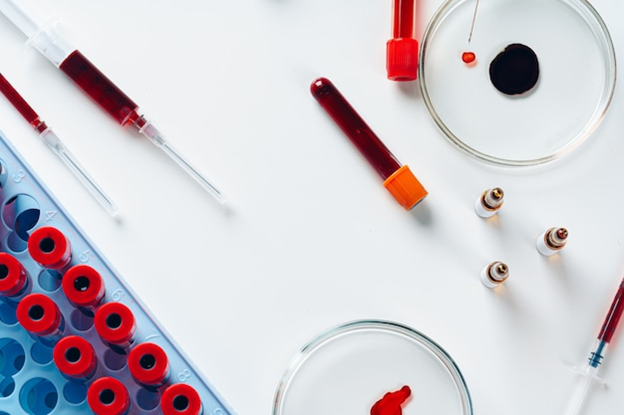Have you ever felt tired for no reason or experience mood swings that catch you off guard? If yes, you’re not alone. Many people deal with unexplained symptoms that might be connected to hormones. To understand these mysterious fluctuations in our health, dive into the world of hormone blood tests.
A hormone blood test can help pinpoint health issues by examining levels of different hormones in the blood. It provides insights into your overall health by detecting imbalances that might lead to symptoms like fatigue or sudden mood changes. Let’s explore why understanding these tests can be a vital aspect of maintaining good health.
The Role of Hormones in Health: A Primer
Hormones, tiny signals in your body, help run various processes. They are made by glands like your thyroid and adrenals. These signals control growth, your mood, sugar balance, and energy.
One hormone called insulin helps keep your blood sugar normal. Estrogen and testosterone aid in reproductive health and aging. Thyroid hormones manage your energy so you feel just right. They all ensure your body armor stays strong.
Balanced hormone levels keep us healthy, no matter if you’re a woman or man. When these levels rise too high or fall too low, life gets tricky. Hormone imbalance can spark many problems, affecting daily life.
- Too much or little estrogen alters menstrual cycles and fertility in women.
- Low testosterone in men can make it hard to build muscles easily.
- Thyroid hormones impact everyone’s weight and emotions equally.
Balanced hormones are necessary for us to feel our best every day.
Knowing the job of hormones helps us lead healthier lives. Today, understanding our hormones can offer clues to health problems early on. Catching such issues early allows action before bigger ones arise, like diabetes or bone weakening over time.
What Are Hormone Blood Tests?
Hormones are chemical messengers in the body that regulate many processes. Sometimes, things feel off, like unexpected tiredness, or weight changes happen too easily. Hormone blood tests are a way to find out what’s going on inside.
To do these tests, medical staff use one of two methods: 1. A needle takes blood from your vein for a larger sample. 2. A finger prick uses a tiny needle to get a small amount.
Both ways are safe and fast, causing little discomfort to anyone.
A typical hormone panel includes various tests for different hormones that affect your health. It checks crucial hormones like estrogen, thyroid, and cortisol to provide insight into important body functions. Here’s why they matter:
- Estrogen: Plays a big role in women’s health and fertility.
- Thyroid Hormones: Keep energy levels and metabolism on track.
- Cortisol: Shows how well you handle pressure and stress changes. These tests help doctors diagnose issues early like thyroid problems, fertility concerns, or stress challenges. Understanding these hormones can lead to targeted care and better health outcomes.
Signs You Might Need a Hormone Blood Test
If you find yourself constantly drained even after a full night’s rest, it might be worth looking into your hormone levels for peace of mind. Hormones play a big part in regulating your energy and mood, guiding your emotional well-being. Flying off the handle or feeling gloomy without reason can indicate hormone issues.
Noticing unexplained changes in how snug your clothes fit can also point to your hormones. Role shifts in your body processes can cause surprising weight fluctuations, often unrelated to diet or activity level.
These observations are signs that you could need a hormone blood test. Simple tests may explain frustrations like never truly feeling rested, emotions spinning wildly, or weight jumping unexpectedly.
Regular screenings at health check-ups help spot problems early on, giving a better chance for easy fixing. Being sure to incorporate a hormone panel test when routines permit can provide valuable insights into potential hormone-driven quirks.
This practice involves you with your healthcare provider in maintaining balanced health, tackling concerns while they’re still tiny and manageable.
The need for hormone checks becomes crucial during important phases like pregnancy or menopause in a woman’s life. Hormones twist and turn in pregnancy, affecting many pregnancy experiences beyond the growing belly.
Menopause brings its own share of changes — hot flashes and mood changes to name a few familiar ones. Knowing where hormones stand helps handle these transitions smoothly:
- Provide relief through managing symptoms together with professionals.
- Guide suitable treatments ensuring comfort over drastic therapy changes.
- Build a clear overview of overall well-being as natural cycles evolve.
Grasping this knowledge empowers women to navigate these essential stages, feeling more informed and at ease with changes.
Decoding Hormone Panels: Key Hormones Tested
A hormone blood test can provide essential health insights. Here are some major hormones commonly tested:
- Estrogen and Progesterone: These relate to menstrual cycles and fertility in women.
- Testosterone: This hormone impacts body structure in both men and women every day.
- Thyroid Hormones: They manage metabolism and maintain energy throughout the body’s systems.
- Cortisol: Known as the stress response hormone, influencing stress regulation.
Each hormone gives clues about different aspects of our health:
- Estrogen can indicate potential issues like menstrual or fertility problems.
- Thyroid hormones help to reveal how our energy is being regulated daily.
- Cortisol shows us how effectively we are dealing with everyday stress.
Examining these levels, we gain a thorough understanding of our complete health picture.
Hormone levels shift like a seesaw due to various personal factors. Gender significantly influences which hormones are more prominent naturally in our bodies.
- Age: Hormones decrease slowly with age, impacting mood as time goes by.
- Life Stage: Puberty, pregnancy, menopause affect hormones with significant changes in life cycles.
Acknowledging these changes helps customize treatments specifically for life’s different phases nicely.
Interpreting Hormone Blood Test Results: Steps and Actions
Reading your hormone blood test results can seem tricky at first. These tests include reference ranges, showing what’s considered normal levels.
Pay attention to what each hormone level means in that range. If unsure, don’t worry because doctors are there to guide you through it.
‘Normal’ doesn’t always mean best for everyone out there. Many feel better with levels slightly outside average. Personalized advice from healthcare providers matters a lot.
By knowing your own needs, you can address worries better than before.
If your results fall out of the normal range given, follow your doctor’s advice closely:
- Retesting might be necessary to make sure results are accurate.
- Talk about lifestyle changes that could help improve those levels.
- Think about medication or hormone therapy if it’s needed and suitable.
Regular check-ins with professionals confirm you’re heading in the right direction. Always keep communication open with them for the best health outcome possible.
Factors Influencing Hormone Test Outcomes
Several elements must be considered before hormone blood tests are performed:
- Diet and Nutrition: What you eat can impact hormone levels significantly.
- Medication: Some medications might change how your hormones appear in tests.
- Sleep and Stress: Both can alter how your body regulates hormones naturally.
Understanding these factors helps you ensure your hormone panel gives the best results.
To achieve accurate outcomes, carefully follow any pre-test instructions given to you:
- Fast when instructed, keeping your body in the right state.
- Avoid certain medications that could upset the test results.
- Take note of timing, especially if your cycle affects hormone tests.
Adhering to these simple instructions prevents inaccuracies that could affect treatment decisions.
While guidance is available online, professional help remains crucial. DIY interpretations might mislead and cause unnecessary worry.
Healthcare professionals offer insights beyond looking at test numbers alone. They assist you with decisions that fit your personal health scenario well.
Empowering Health with Proactive Hormone Testing
Taking charge of your health means embracing hormone blood tests and lifestyle changes. Combine your test results with a balanced diet, focusing on foods like those plentiful in omega-3. These foods help maintain hormonal balance by encouraging healthy cellular functioning. A regular exercise routine is also beneficial in keeping your stress under control.
- Eat balanced meals: Add lean proteins, fruits, vegetables, and whole grains.
- Handle stress: Use meditation or yoga to manage cortisol levels.
Regular hormone panel screenings are essential to prevent possible health problems before they start. By consistently monitoring your hormones, you can spot imbalances early and act promptly. This proactive method avoids drastic lifestyle changes and keeps you feeling great.
New technology has made hormone blood tests even more accurate than before. Modern systems offer faster and more precise results, helping doctors find issues that may have been missed. Patients receive better advice based on reliable assessments and enjoy improved ease of testing.
Conclusion: Towards Better Hormonal Health
Hormone imbalances might sound scary, but they’re more common than you think. Fortunately, these imbalances can be managed with the right approach and care. Early detection through hormone blood tests can lead to effective solutions that promote your well-being. Addressing imbalances early gets you back to feeling healthy faster.

Collaborate closely with your healthcare provider for interpreting hormone panel results. They can provide insights beyond just the numbers and suggest a treatment plan. Use their guidance to navigate your journey towards understanding and improving your health.
- Keep asking questions until you’re satisfied with the answers given.
- Follow the advised lifestyle changes or medications for best results.
When looking for trustworthy testing services, SLP Diagnostics is a solid pick for hormone blood tests in India. With state-of-the-art facilities, SLP offers reliable and quick test results. Choosing SLP could be a smart move towards achieving balanced hormonal health. Opt for diagnostics that focus on precision, support, and your overall wellness.


